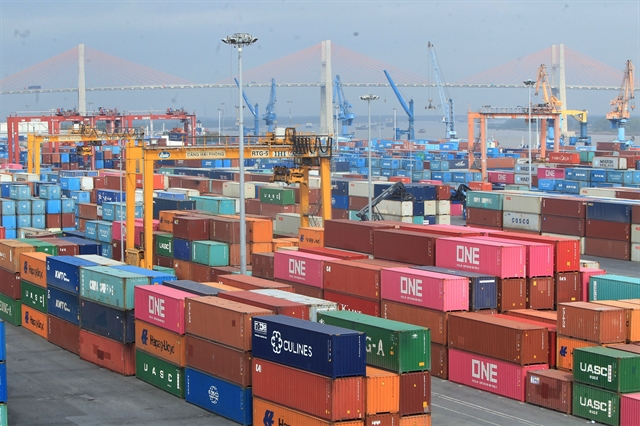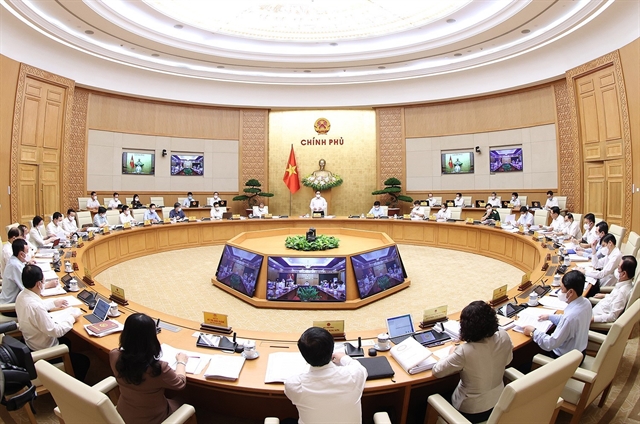
HÀ NỘI — Việt Nam’s economic performance in the first five months of 2021 means the country remains on track for solid growth despite two waves of COVID-19 outbreaks, heard a Government meeting on Thursday in Hà Nội.
According to socio-economic reports presented at the meeting chaired by Prime Minister Phạm Minh Chính, import-export value in the five months reached US$261.75 billion – with total exports hitting $130.94 billion and imports of $130.81 billion – up 33.2 per cent compared to the same period last year when countries around the world started implementing restrictions measures to curb the spread of the coronavirus.
Of the 22 types of goods that enjoyed total turnover larger than $1 billion, six topped $5 billion. Exports of industrial products rose by 33 per cent, agro-forestry products increased by 13.5 per cent and fisheries by 12 per cent compared to 2020. The US remains the biggest export market of Việt Nam, followed by China, EU, ASEAN, South Korea and Japan.
Việt Nam recorded a trade surplus of about $370 million in the first five months, with May the only month with a trade deficit of $2 billion.
Other economic indicators were also optimistic, as industrial output rose 9.9 per cent, the number of new companies established increased by 15.4 per cent, foreign direct investment (FDI) sent Việt Nam hit $14 billion (up by 8.8 per cent), and the consumer price index (CPI) went 1.29 per cent higher than the previous year.
State budget collection in the first five months alone reached 50 per cent of the yearly estimate, up by 15.2 per cent compared to last year.
Việt Nam is the only country that has had its outlook recently upgraded to positive by credit rating agencies Moody's, Fitch and S&P.
PM Chính said the economy is considered to have maintained a stable macroeconomic foundation and controlled inflation, interest rates and exchange rates, despite adverse impacts from coronavirus outbreaks in the country and abroad.
However, he pointed out several shortcomings – including stumbles in dealing with COVID-19 outbreaks, slow rollout of vaccines, behind-schedule disbursement of public investment capital, the heavy reliance on foreign businesses in the country’s exports and cybercrimes.
He also expressed concerns over the initial signs of a trade deficit, despite reassurance from industry and trade officials that the country is importing more materials to produce goods for exports – such as electronic components and materials for textile and footwear sectors.
PM Chính said that hardship and challenges lie ahead in the near future due to the risks of even more intense COVID-19 outbreaks.
He said the Government is committed to tackling the ongoing fourth wave of infections to protect people's health and lives, get the country back on track for post-pandemic economic recovery and development, ensure livelihood and social security for those hardest hit by the pandemic and the vulnerable groups; as well as maintain political stability and strengthen Việt Nam’s foreign relations.

On behalf of the Government, PM Chính praised the authorities at all levels, especially of current COVID-19 hotspots as well as frontline forces like the army, police, and medical workers in particular, who have been determined to protect public health despite numerous difficulties.
The outbreaks are "basically" under control but there are still very concerning developments in the hotspots, PM Chính noted, urging people and State agencies to exercise utmost caution and the highest levels of prevention and control measures.
Vaccination will continue to be the key measure that needs to be implemented more effectively, he said, adding that advanced technology should be deployed more in the fight against the pandemic.
The Government leader called for resolving institution and policy bottlenecks in terms of COVID-19 vaccination, support regimes for labourers and businesses impacted by the pandemic, public investment projects and poor-performing projects.
PM Chính also said financial and fiscal discipline must be tightened, especially in terms of policies to help achieve economical use of the State budget, so more can be spent on key issues and for particularly economically challenged regions. — VNS
Xem thêm: lmth.gniteem-tvog-91-divoc-etipsed-kcart-no-ecnamrofrep-cimonoce/384569/swal-scitilop/nv.swenmanteiv